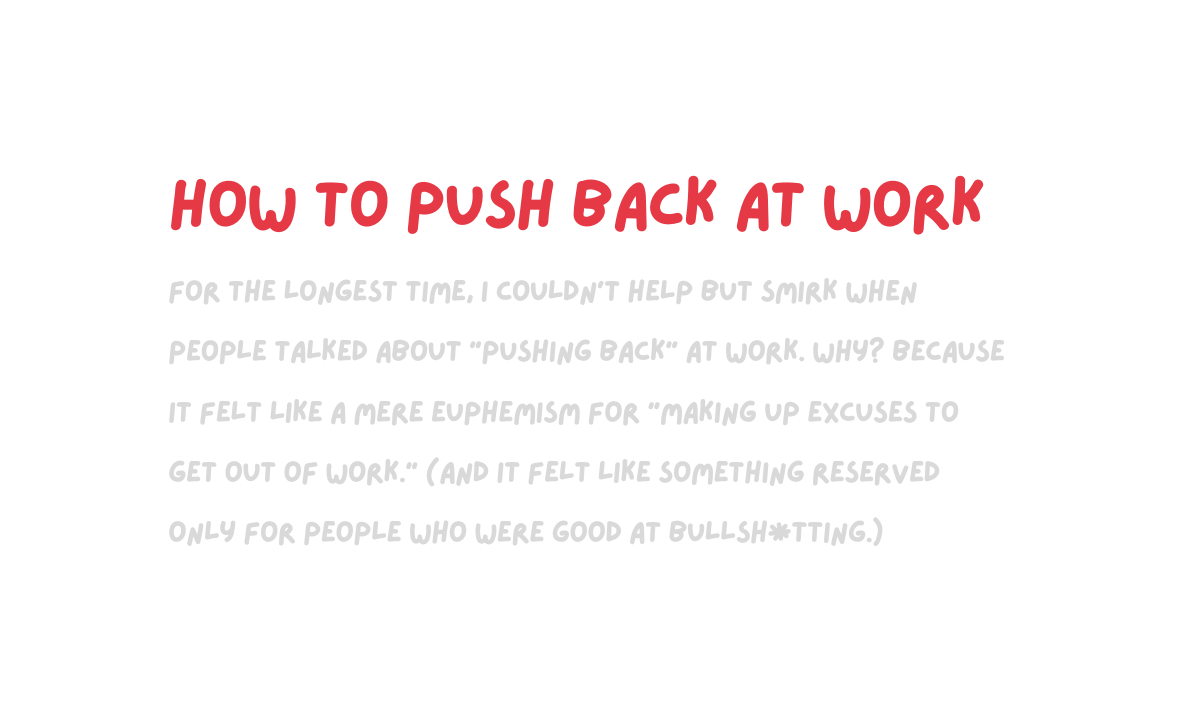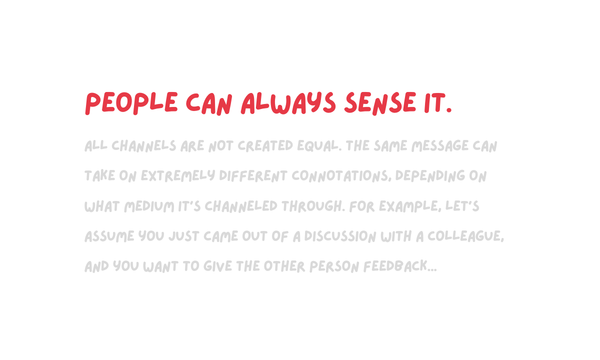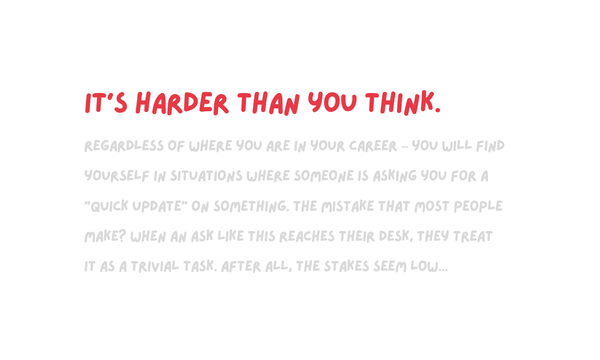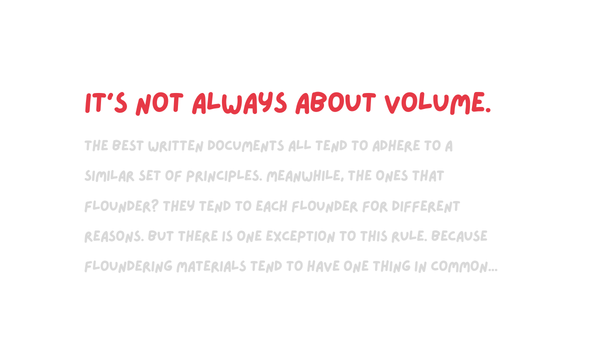How to push back at work (without feeling bad)

For the longest time, I couldn't help but smirk when people talked about "pushing back" at work.
Why? Because I saw it as sugarcoating. It felt like a mere euphemism for "making up excuses to get out of work."
(And it felt like something reserved only for people who were good at bullsh*tting.)
But as the years went on, I changed my mind.
I not only got over the guilt of pushing back when I needed to – but also developed effective ways to do so at work.
So in today's issue: we'll talk about the principles you can leverage – and the mindset you need – when it comes to pushing back and protecting your time at work.
- It's never all or nothing.
- Always anchor on principles.
- Sincerity trumps a sh*t sandwich.
- Motion does not always equal progress.
- Lead with empathy (and the rest will follow).
Let's start first with a couple common misconceptions.
Pushing Back: What It Isn't
The first misconception is this: thinking that effective pushing back requires talking in a "tricky manner." Thinking that it's all about using flowery language to "fend off" people.
(Why? Because that way, you sound smart and no one can challenge you.)
As we'll discuss later – this is misguided. Relying on smoke and mirrors can only take you so far.
The second misconception is this: thinking that unless your calendar is already full, you have no right to say "no."
(After all, if you're still "on the clock," what gives you the right to push back?)
Again, as we'll discuss later – this is not true. This type of thinking is counterproductive, and tends to lead to burnout.
So what does pushing back actually entail instead?
1️⃣ It's never all or nothing.
The struggle (and reluctance) to push back often stems from a false dilemma, i.e. thinking that you can either only say yes or no – and that there's no in between.
But this is false. You're never looking at either 0% or 100%. It's never all or nothing.
Because you can...
- ...say no to certain things, and yes to others
- ...say no to an ask, but offer alternative ways of helping
- ...say no for now, but offer to reassess when time frees up
Here are some good examples of this principle in action:
"I'm not able to own the data analysis, but I can be a thinking partner and help brainstorm the storyline."
"I don't have time to help find datapoints for this, but I can compile a list of talking points I've used in the past and send it to you."
"I'm not able to take this on right now as I am prioritizing Project X, but I'm happy to revisit this ask again in 2 weeks."
The key is this: if you assume that the attempt to "push back" can only result in binary outcomes, you will struggle.
You'll either end up feeling overwhelmed (by taking on too much), or end up alienating your stakeholders (by being unhelpful).
So instead? Acknowledge the many shades of grey that can exist. Find creative ways to be helpful. It doesn't have to be all or nothing.
👋 Subscribe for free to get Herng's newsletter directly in your inbox.
2️⃣ Always anchor on principles.
Let me be clear: not everybody feels awkward pushing back.
Because some people have the opposite problem. They push back too much, too liberally, and too bluntly.
But you can't always use "I'm too busy" or "I don't have bandwidth" as your excuse. That can only take you so far.
Instead, to optimize for the long game? I suggest developing your own set of operating principles.
This can include things like:
- Rules of engagement
- Scope of work
- Prioritization principles
Because if you are thoughtful (and consistent) in communicating your operating principles?
It makes it easier to push back. And easier for others to understand why.
Let's look at some examples of it in action.
Example #1: Imagine that someone sends you a brief email requesting your immediate support on a project.
This is when you can allude to your rules of engagement:
"I'd love to help, but this request appears complex enough to justify us actually sitting down to discuss in detail. So instead of me diving in right away, let's grab time next week to chat and see how I can be most helpful."
Example #2: Imagine that someone sends you a draft presentation, and asked you to "make it look nicer" (since you happen to be good at slide design).
This is when you can allude to your scope of work:
"I don't think helping with cosmetic changes is where I can be most helpful, but I'm more than happy to help revamp Slide 5, given it is the money slide and critical for us to get right.
Example #3: Imagine that you have been asked to join an hour-long meeting to discuss something well within your purview, but you have more pressing matters to attend to.
This is when you can allude to your prioritization principles:
Unfortunately I need to prioritize the delivery of Project X this week. How about I join the first 10 minutes so I can give my view on Issue A, and for the rest I'll follow up offline with my team?
Remember: it's OK to say no – but make sure you help others understand why.
It'll make collaboration in the future easier as well.
👋 Subscribe for free to get Herng's newsletter directly in your inbox.
3️⃣ Sincerity trumps a sh*t sandwich.
Pushing back is akin to delivering bad news.
And so the mistake people make?
Hiding the "NO" amongst a long and confusing ramble, hoping that it will "soften the blow."
But that's essentially a sh*t sandwich. It's not helpful for anyone.
Instead, it's always better to be crisp, straightforward, and sincere. It is the most effective thing you can do.
❌ So stop doing this:
"Thanks for bringing up this request! This sounds like a really exciting project, and I'd love to help out as much as I can. However, as you know I'm rather short on time these days given Project X – not sure if you've heard about it, but the objective of Project X is to... [irrelevant detail to soften the blow and create misdirection] ...and therefore as a result I might not be able to support right away, but please keep me posted.
✔️ And instead just do this:
"Thanks for giving me context! Unfortunately, I need to prioritize shipping Project X before the end of next week, so I can't take on new requests for now. But how about we pencil in a working session two weeks from now instead?"
👋 Subscribe for free to get Herng's newsletter directly in your inbox.
4️⃣ Motion does not always equal progress.
I've previously written about the trap of "fake" busy-ness.
It is why we feel guilty when we turn down requests – especially when we technically still have bandwidth.
But you do not have to overwhelm yourself to feel productive. Motion does not always lead to progress.
(In fact, when misguided, motion can actually come at the expense of progress.)
For the longest time, this explained why I always felt uneasy pushing back on requests – unless I was absolutely swamped already.
But you do not have to feel guilty for protecting and prioritizing your time.
Because:
- The nature of the work and your principles (see point #2) dictate what you take on – not how much bandwidth you have left
- Taking on new requests requires context-switching and almost always adds more mental tax than expected
- Compromising your operating principles sets a bad precedent (but of course, you can make exceptions – just explicitly say so)
Remember: the goal is not to fill up your calendar to the brim.
It's to drive impact while focusing on the most important things.
5️⃣ Lead with empathy (and the rest will follow).
Pushing back can feel like a lose-lose if you always think of it as a zero-sum game.
Why? Because:
- Push back too much, and you may feel guilty and unhelpful
- Push back too little, and you may feel overwhelmed and burnt out
That's why you can't think of it as "me" vs "them."
Instead, it's most productive if you remind yourself:
- "My operating principles are tablestakes. No shame in that."
- "But within these constraints? I will do whatever I can do help. Because at the end of the day, we are on the same team."
This mindset shift may seem subtle, but it turns the less comfortable act of negotiating into a joint problem-solving exercise.
(And the problem in this case? It's figuring out how to contribute while still sticking to your constraints.)
In other words, pushing back is fine – but you can't lead with defensiveness. People can tell.
Instead, the best operators lead with empathy. So instead of thinking:
"How do I fend off this request?"
They ask themselves:
"How can I help them achieve their goals, despite my constraints?"
The best operators know that they're on the same team as their interlocutor – and they demonstrate a certain level of proactiveness. Even if their hands are tied.
And when you do that? Trust me – people can tell.


